时态+例句,介词
- 格式:doc
- 大小:101.00 KB
- 文档页数:2
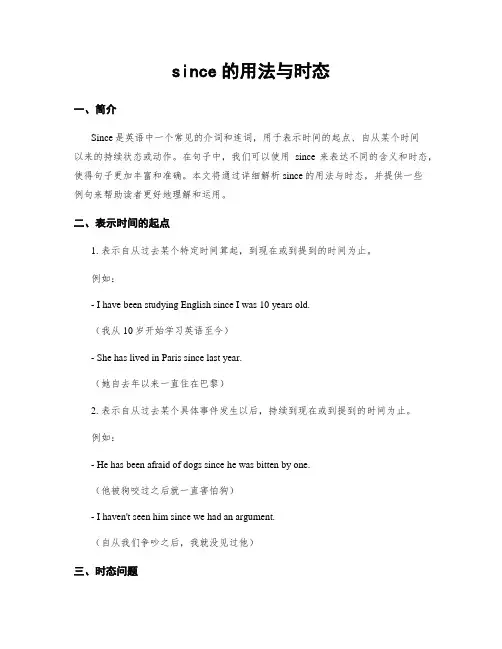
since的用法与时态一、简介Since是英语中一个常见的介词和连词,用于表示时间的起点、自从某个时间以来的持续状态或动作。
在句子中,我们可以使用since来表达不同的含义和时态,使得句子更加丰富和准确。
本文将通过详细解析since的用法与时态,并提供一些例句来帮助读者更好地理解和运用。
二、表示时间的起点1. 表示自从过去某个特定时间算起,到现在或到提到的时间为止。
例如:- I have been studying English since I was 10 years old.(我从10岁开始学习英语至今)- She has lived in Paris since last year.(她自去年以来一直住在巴黎)2. 表示自从过去某个具体事件发生以后,持续到现在或到提到的时间为止。
例如:- He has been afraid of dogs since he was bitten by one.(他被狗咬过之后就一直害怕狗)- I haven't seen him since we had an argument.(自从我们争吵之后,我就没见过他)三、时态问题1. 现在完成时:主要用于强调“从过去某个特定时间一直持续到现在”的状态或动作。
例如:- They have known each other since childhood.(他们从小就互相认识)- We have been waiting for the bus since 8 o'clock this morning.(我们从今天早上8点开始等公交车)2. 过去完成时:主要用于强调“过去某个特定的时间点之前一直持续到那个时间点”的状态或动作。
例如:- She had been married for 10 years since we last saw her.(自从我们上次见她已经结婚10年了)- I hadn't visited my grandparents since they moved to the countryside.(自从他们搬到乡下,我就没去看过爷爷奶奶)3. 过去时:当表示一段已经结束的具体时间里发生的事件,可以使用since引导过去时句子。
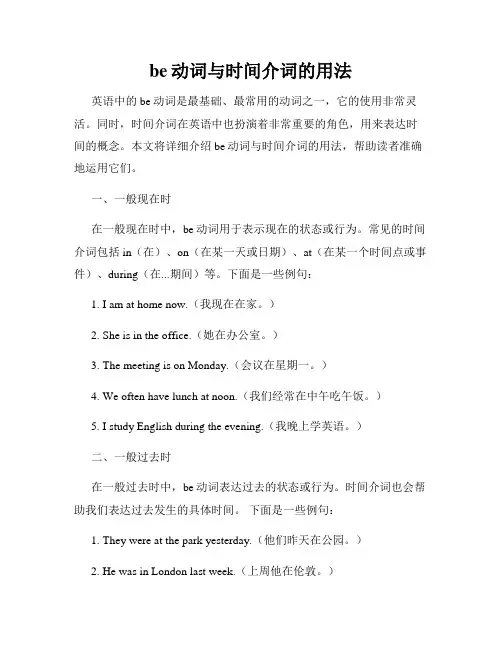
be动词与时间介词的用法英语中的be动词是最基础、最常用的动词之一,它的使用非常灵活。
同时,时间介词在英语中也扮演着非常重要的角色,用来表达时间的概念。
本文将详细介绍be动词与时间介词的用法,帮助读者准确地运用它们。
一、一般现在时在一般现在时中,be动词用于表示现在的状态或行为。
常见的时间介词包括in(在)、on(在某一天或日期)、at(在某一个时间点或事件)、during(在...期间)等。
下面是一些例句:1. I am at home now.(我现在在家。
)2. She is in the office.(她在办公室。
)3. The meeting is on Monday.(会议在星期一。
)4. We often have lunch at noon.(我们经常在中午吃午饭。
)5. I study English during the evening.(我晚上学英语。
)二、一般过去时在一般过去时中,be动词表达过去的状态或行为。
时间介词也会帮助我们表达过去发生的具体时间。
下面是一些例句:1. They were at the park yesterday.(他们昨天在公园。
)2. He was in London last week.(上周他在伦敦。
)3. The concert was on Saturday evening.(音乐会是在周六晚上。
)4. She studied English during her college years.(她在大学期间学习英语。
)三、进行时进行时表示现在或过去某个时间正在进行的动作或状态。
be动词与时间介词的结合在进行时态中更为重要。
下面是一些例句:1. They are playing basketball in the park.(他们正在公园打篮球。
)2. I was studying at the library when you called.(你打电话时我正在图书馆学习。
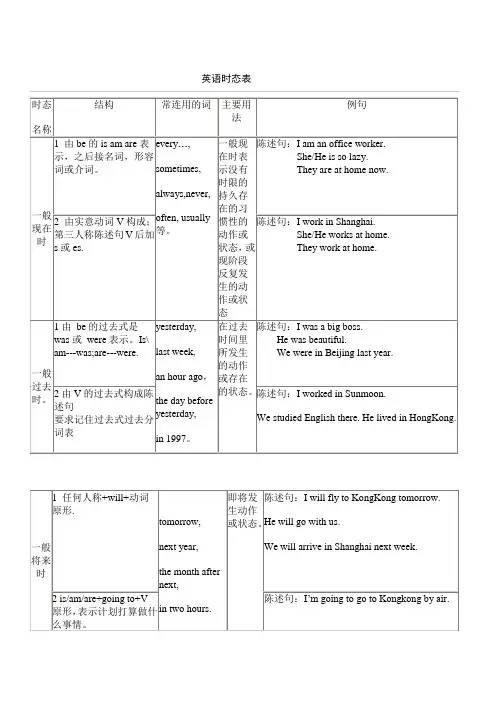
英语时态表被动语态第一节被动语态的构成被动语态的基本结构是“助动词be +done (过去分词)”。
被动语态的谓语动词从上表中可以看出,被动语态的各种时态变化都是通过助动词“be”的各种时态来表示的,因此只要知道“be”的时态形式,也就掌握了被动语态构成。
下面是被动语态各种时态的例句:e.g. You are wanted on the phone . 有你的电话。
(一般现在时)The railway was built in 1998. 这条铁路建于1998 年。
(一般过去时)A new railway is being built in this city. 这个城市正在修建一条新的铁路。
(现在进行时)The new railway has already been built.新铁路已经建成了。
(现在完成时)The new railway had been built by the end of last year.这条铁路在去年年底前已经建成了。
(过去完成时)A new railway will be built in this city next year.这个城市明年将建一条新的铁路。
(一般将来时)注意:在一些固句型中常用被动语态结构,如:It is said that … 据说……,人们说……It is reported that … 据报道…… It is hoped that … 人们希望……It is well known that… 众所周知…… It is believed that…人们相信……It must be admitted that…必须承认…… It must be pointed that…必须指出的是代词1. ________ am a student . _______name is Peter. The book is _______(I)2. ______ are in China. These are not _______coats. ______ are over there.(their)3. ________ (who) pen is this. I think it’s ________(Bill)4. The book is _________(Mary and Jane)5. The pens are the _________(students)二. 用人称代词填空:1. Tell ___(她,他,我,我们)how to get there.2. Put ___(它,它们)there.3. ___(他们)say ___(他,她)is very clever.4. Who is there? It’s ___(我).5. What time is ___? ___’s 12o’clock.6. How far is ___ to the zoo?7. ___ is so cold today.8. Tell ___(我,我们)how far is ___ from Shanghai to Nanking.9. ___’s damp and cold. ___ think ___’s going to rain.10. Show ___ how to do ___.三. 用物主代词填空:1. Is this ___(你的)classroom? No, i t’s not ___(我们的). He’s ___(他们的).2. ___(他的)father is an architect and ___(她的)is an engineer.3. ___(谁的)keys are these? —___ are ___(他的), not ___(我的).4. This isn’t ___(我的)car; ___(我的)is being repaired.5. Is the coat ___(你的)or ___(她的)? It’s ___(我的),not ___(她的).6. ___(她的)views of life and very different from ___(我们的).7. This is ___(我的)umbrella and that one is ___(你的).8. This coat of ___(你的)is much nicer than ___(我的).9. Those ties of ___(他们的)must be more expensive than ___(我们的).10. I like ___(你的)better than ___(她的).10. Let _____ give _____ a book. 让我给你一本书。
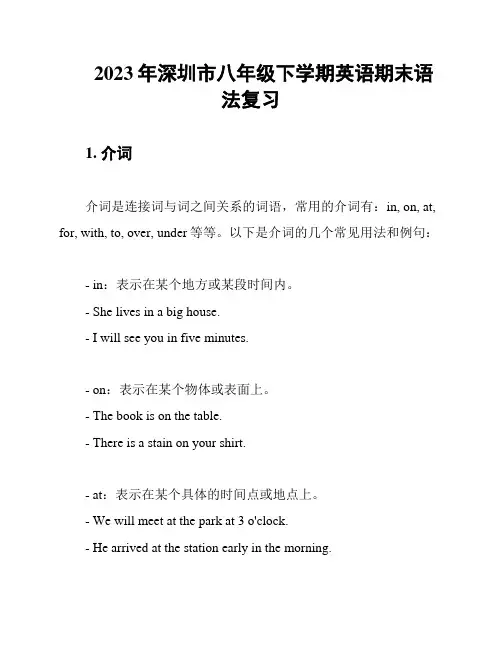
2023年深圳市八年级下学期英语期末语法复习1. 介词介词是连接词与词之间关系的词语,常用的介词有:in, on, at, for, with, to, over, under等等。
以下是介词的几个常见用法和例句:- in:表示在某个地方或某段时间内。
- She lives in a big house.- I will see you in five minutes.- on:表示在某个物体或表面上。
- The book is on the table.- There is a stain on your shirt.- at:表示在某个具体的时间点或地点上。
- We will meet at the park at 3 o'clock.- He arrived at the station early in the morning.2. 动词时态动词时态表示动作发生的时间,常见的时态有:一般现在时、一般过去时、一般将来时等。
以下是几个常用时态的用法和例句:- 一般现在时:表示经常或惯性的动作。
- I go to school every day.- She likes to read books.- 一般过去时:表示过去发生的动作或存在的状态。
- We visited our grandparents last weekend.- He studied hard for the exam.- 一般将来时:表示将来要发生的动作或存在的状态。
- They will go on a trip next month.- She is going to meet her friends tomorrow.3. 名词单复数名词用于表示人、物或概念,单数和复数形式有所区别。
以下是名词单复数的用法和例句:- 单数名词:表示一个人、一个事物或一个概念。
- I have a book.- She is a student.- 复数名词:表示多个人、多个事物或多个概念。
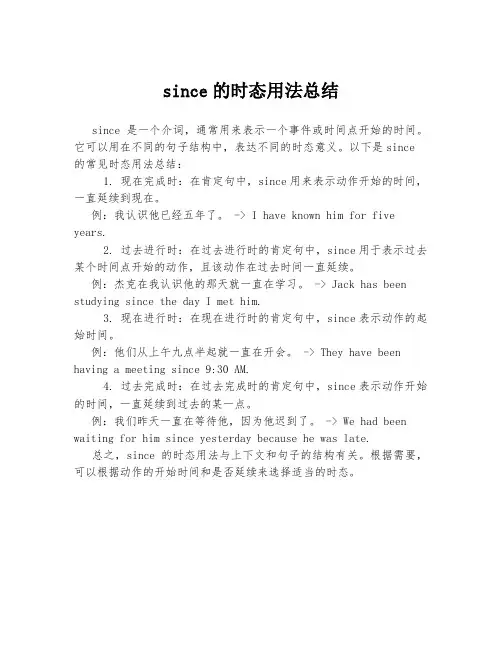
since的时态用法总结
since是一个介词,通常用来表示一个事件或时间点开始的时间。
它可以用在不同的句子结构中,表达不同的时态意义。
以下是since 的常见时态用法总结:
1. 现在完成时:在肯定句中,since用来表示动作开始的时间,一直延续到现在。
例:我认识他已经五年了。
-> I have known him for five years.
2. 过去进行时:在过去进行时的肯定句中,since用于表示过去某个时间点开始的动作,且该动作在过去时间一直延续。
例:杰克在我认识他的那天就一直在学习。
-> Jack has been studying since the day I met him.
3. 现在进行时:在现在进行时的肯定句中,since表示动作的起始时间。
例:他们从上午九点半起就一直在开会。
-> They have been having a meeting since 9:30 AM.
4. 过去完成时:在过去完成时的肯定句中,since表示动作开始的时间,一直延续到过去的某一点。
例:我们昨天一直在等待他,因为他迟到了。
-> We had been waiting for him since yesterday because he was late.
总之,since的时态用法与上下文和句子的结构有关。
根据需要,可以根据动作的开始时间和是否延续来选择适当的时态。
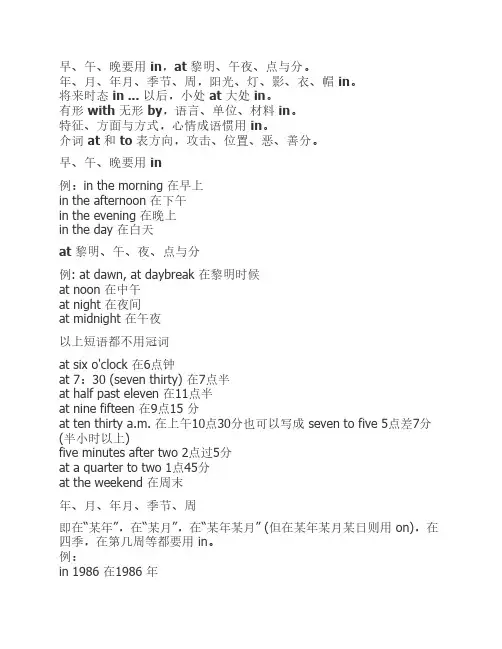
早、午、晚要用 in,at 黎明、午夜、点与分。
年、月、年月、季节、周,阳光、灯、影、衣、帽 in。
将来时态 in ... 以后,小处 at 大处 in。
有形 with 无形 by,语言、单位、材料 in。
特征、方面与方式,心情成语惯用 in。
介词 at 和 to 表方向,攻击、位置、恶、善分。
早、午、晚要用 in例:in the morning 在早上in the afternoon 在下午in the evening 在晚上in the day 在白天at 黎明、午、夜、点与分例: at dawn, at daybreak 在黎明时候at noon 在中午at night 在夜间at midnight 在午夜以上短语都不用冠词at six o'clock 在6点钟at 7:30 (seven thirty) 在7点半at half past eleven 在11点半at nine fifteen 在9点15 分at ten thirty a.m. 在上午10点30分也可以写成 seven to five 5点差7分(半小时以上)five minutes after two 2点过5分at a quarter to two 1点45分at the weekend 在周末年、月、年月、季节、周即在“某年”,在“某月”,在“某年某月” (但在某年某月某日则用 on),在四季,在第几周等都要用 in。
例:in 1986 在1986 年in 1927 在1927 年in April 在四月in March 在三月in December, 1986 1986年12月in July, l983 1983年7月in spring 在春季 in summer 在夏季in autumn 在秋季 in winter 在冬季in the fist week of this semester 这学期的第一周in the third week 在第三周阳光、灯、影、衣、冒 in,即在阳光下,在灯下,在树阴下,穿衣、着装、冒雨等都要用 in。
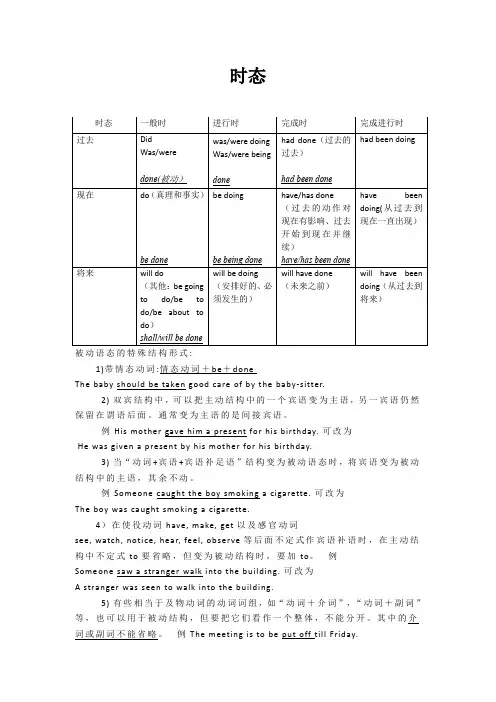
被动语态的特殊结构形式:1)带情态动词:情态动词+be+doneThe baby should be taken good care of by the baby-sitter.2) 双宾结构中,可以把主动结构中的一个宾语变为主语,另一宾语仍然保留在谓语后面。
通常变为主语的是间接宾语。
例His mother gave him a present for his birthday. 可改为He was given a present by his mother for his birthday.3) 当“动词+宾语+宾语补足语”结构变为被动语态时,将宾语变为被动结构中的主语,其余不动。
例Someone caught the boy smoking a cigarette. 可改为The boy was caught smoking a cigarette.4)在使役动词have, make, get以及感官动词see, watch, notice, hear, feel, observe等后面不定式作宾语补语时,在主动结构中不定式to要省略,但变为被动结构时,要加to。
例Someone saw a stranger walk into the building. 可改为A stranger was seen to walk into the building.5) 有些相当于及物动词的动词词组,如“动词+介词”,“动词+副词”等,也可以用于被动结构,但要把它们看作一个整体,不能分开。
其中的介词或副词不能省略。
例The meeting is to be put off till Friday.地点1. atinonto1)at (1)小地方(2)在……附近,旁边2)in (1)大地方(2)在…范围之内3)on 毗邻,接壤Russia lies on the north of China.4)to 在……范围外,不强调是否接壤Fujian is to the south of Jiangsu Province. 2. above over on 在……上1)above 在……上方,不强调是否垂直,与below相对2)over 垂直的上方,与under相对,但over与物体有一定的空间,不直接接触3)on 在某物体上面并与之接触3. below under 在……下面1)under 在…正下方There is a cat under the table.2)below 在……下,不一定在正下方Please write your name below the line. 时间1. in on at 在……时1)in 较长时间,如世纪、朝代、时代、年、季节、月及一般(非特指)的早、中、晚等如in the 20th century,in the 1950s,in 1989,in summer,in January,in the morning,in the night,in one’s life ,in one’s thirties等2)on具体某一天及其早、中、晚。
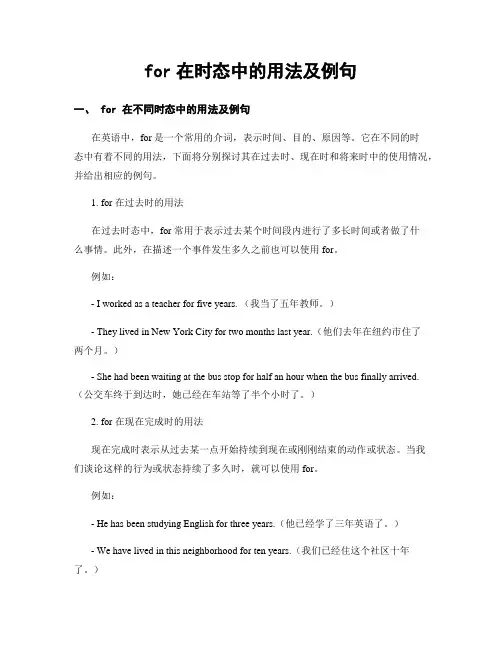
for在时态中的用法及例句一、 for 在不同时态中的用法及例句在英语中,for 是一个常用的介词,表示时间、目的、原因等。
它在不同的时态中有着不同的用法,下面将分别探讨其在过去时、现在时和将来时中的使用情况,并给出相应的例句。
1. for 在过去时的用法在过去时态中,for 常用于表示过去某个时间段内进行了多长时间或者做了什么事情。
此外,在描述一个事件发生多久之前也可以使用 for。
例如:- I worked as a teacher for five years. (我当了五年教师。
)- They lived in New York City for two months last year.(他们去年在纽约市住了两个月。
)- She had been waiting at the bus stop for half an hour when the bus finally arrived.(公交车终于到达时,她已经在车站等了半个小时了。
)2. for 在现在完成时的用法现在完成时表示从过去某一点开始持续到现在或刚刚结束的动作或状态。
当我们谈论这样的行为或状态持续了多久时,就可以使用 for。
例如:- He has been studying English for three years.(他已经学了三年英语了。
)- We have lived in this neighborhood for ten years.(我们已经住这个社区十年了。
)- She has worked for the same company since she graduated from college.(自从她大学毕业以来,她一直在同一家公司工作。
)3. for 在将来时的用法将来时态用于表达将要发生的事件或动作。
当我们谈论一个活动或事件计划在未来持续多长时间时,也可以使用 for。
例如:- I will be on vacation for a week starting next Monday.(我下周一开始度假一周。
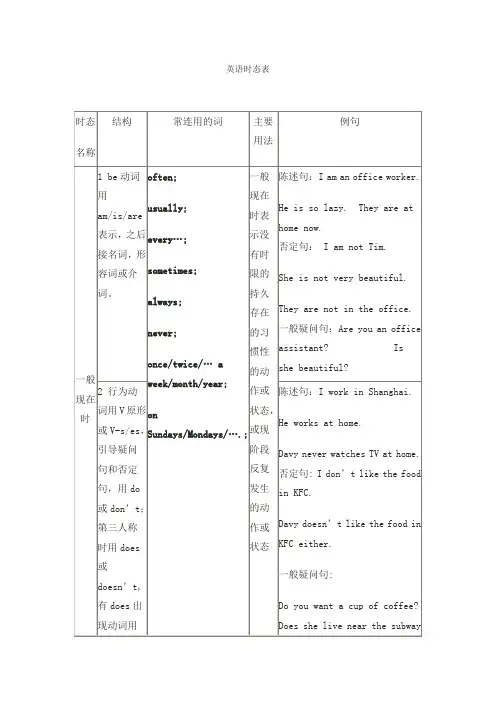
英语时态表补充:一、情态动词can, must, may。
may没有否定形式。
陈述句: I can drive a car. He must tell the truth. We may get there on foot.否定句:I can’t swim at all. You mustn’t(表示禁止)smoke in the office.一般疑问句: Can you wait a minute? Must I stay at home? May I use your phone?特殊疑问句:How can I get there? What must I do now?由情态动词的过去式构成,can—could.She could walk when she was one year old.I could not speak English one year ago.二、各种时态用法补充:1、一般现在时(1)在由after, until, befor, once, when, even if ,in case, as long as, as soon as, the moment以及if, unless等引导的时间状语从句或条件状语从句中,通常用一般现在时代替将来时。
例:I will tell him the news as soon as I see him.我一看见他,就把消息告诉他。
(2)某些表示起始的动词,可用一般现在时表示按规定、计划或安排要发生的动作,这类动词有:be, go, come, start, depart, arrive, begin, leave等。
(3)在由why, what, where, whoever, who, that,as等引导的从句中,也常用一般现在时代替将来时。
例:Tomorrow at this time we’ll give $500 to any one who brings him to justice.2、一般将来时(1)be going to +v在口语中广泛使用,表示准备做或即将发生的事情。
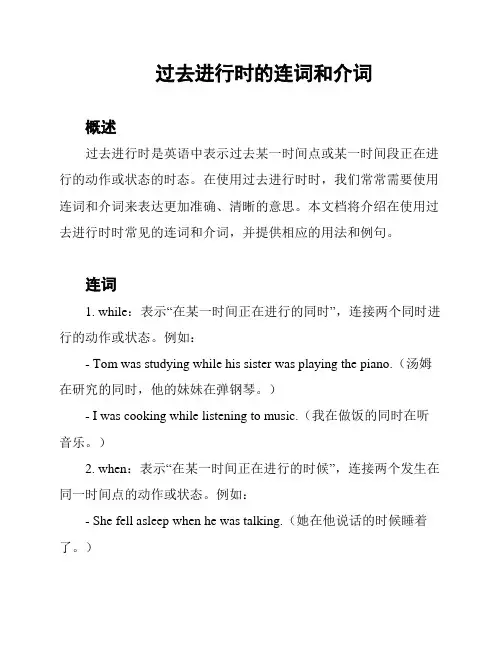
过去进行时的连词和介词概述过去进行时是英语中表示过去某一时间点或某一时间段正在进行的动作或状态的时态。
在使用过去进行时时,我们常常需要使用连词和介词来表达更加准确、清晰的意思。
本文档将介绍在使用过去进行时时常见的连词和介词,并提供相应的用法和例句。
连词1. while:表示“在某一时间正在进行的同时”,连接两个同时进行的动作或状态。
例如:- Tom was studying while his sister was playing the piano.(汤姆在研究的同时,他的妹妹在弹钢琴。
)- I was cooking while listening to music.(我在做饭的同时在听音乐。
)2. when:表示“在某一时间正在进行的时候”,连接两个发生在同一时间点的动作或状态。
例如:- She fell asleep when he was talking.(她在他说话的时候睡着了。
)- The phone rang when I was taking a shower.(我在洗澡的时候电话响了。
)3. as:表示“当……时候”、“一边……一边”,连接两个同时进行或并行发生的动作或状态。
例如:- I saw him as I was walking along the street.(我在街上走的时候看见了他。
)- She was singing as she was driving.(她一边开车一边唱歌。
)介词1. during:表示“在……期间”,用于说明在某一段时间内正在进行的动作或状态。
例如:- She was reading a book during the flight.(她在飞机上看书。
)- They chatted during the break.(他们在休息时聊天。
)2. while:表示“在……的同时”,用于说明在某一时间段内同时进行的动作或状态。
注意,while既可以作为连词连接两个同时进行的动作或状态,也可以作为介词表示“在……的同时”。
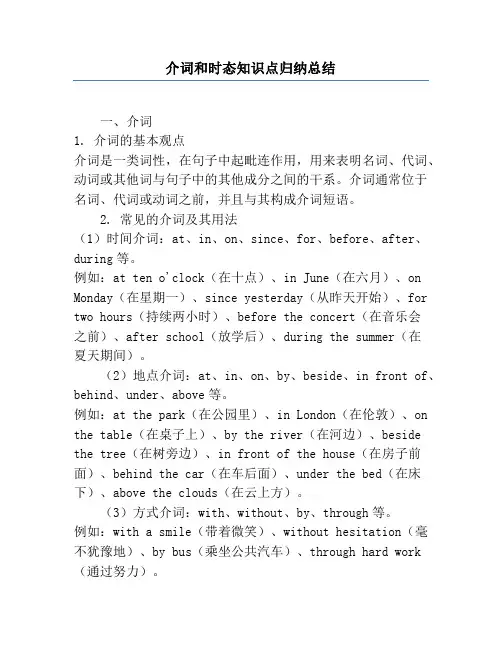
介词和时态知识点归纳总结一、介词1. 介词的基本观点介词是一类词性,在句子中起毗连作用,用来表明名词、代词、动词或其他词与句子中的其他成分之间的干系。
介词通常位于名词、代词或动词之前,并且与其构成介词短语。
2. 常见的介词及其用法(1)时间介词:at、in、on、since、for、before、after、during等。
例如:at ten o'clock(在十点)、in June(在六月)、on Monday(在星期一)、since yesterday(从昨天开始)、for two hours(持续两小时)、before the concert(在音乐会之前)、after school(放学后)、during the summer(在夏天期间)。
(2)地点介词:at、in、on、by、beside、in front of、behind、under、above等。
例如:at the park(在公园里)、in London(在伦敦)、on the table(在桌子上)、by the river(在河边)、beside the tree(在树旁边)、in front of the house(在房子前面)、behind the car(在车后面)、under the bed(在床下)、above the clouds(在云上方)。
(3)方式介词:with、without、by、through等。
例如:with a smile(带着微笑)、without hesitation(毫不犹豫地)、by bus(乘坐公共汽车)、through hard work (通过努力)。
(4)目标介词:for、to、in order to等。
例如:for fun(为了好玩)、to learn(为了进修)、in order to pass the exam(为了通过考试)。
3. 介词的常见错误使用(1)误用介词或多余使用介词错误示例:I go to school by foots.(多余使用介词by)正确示例:I go to school on foot.(不使用介词,直接用动词短语)(2)介词的搭配错误错误示例:I am looking forward to see you.(搭配错误)正确示例:I am looking forward to seeing you.(正确搭配)二、时态1. 时态的基本观点时态表示动作或状态发生的时间。
by的用法时态一、了解“by”的基本用法时态1.1 介词“by”的基本含义和用法介词“by”是英语中常见的一个介词,广泛用于表示动作的执行者、工具、方法、手段等。
它可以被结构化为“by + 名词短语”,在句子中起到表示手段或方式的作用。
下面将详细介绍“by”的不同时态所表示的含义。
1.2 “By”与一般现在时态连用当我们使用一般现在时态时,介词“by”通常表达以下三种含义:1.2.1 表示“被”动作的执行者在这种情况下,“by”的后面跟着动作的执行者,表示某人或某物是动作的发起者。
例如:“The book was written by Mark Twain.”(这本书是由马克·吐温写的。
)1.2.2 表示通过某个方式或手段实现某事当我们想要强调通过什么方式或手段来实现某事时,可以使用“by”。
例如:“You can learn a lot of new skills by watching educational videos.”(通过观看教育视频,你可以学到很多新技能。
)1.2.3 表示按照规定或指引“By”也可以表示按照规定或指引进行操作。
例如:“Please submit your report by tomorrow morning.”(请在明天早晨前提交你的报告。
)二、“by”的其他时态用法除了一般现在时态,介词“by”还可以与其他时态连用,如下所示:2.1 过去时态在过去时态中,“by”可以表示动作的执行者、方式或手段。
例如:“The Statue of Liberty was created by French sculptor Frédéric Auguste Bartholdi.”(自由女神像是由法国雕塑家弗雷德里克·奥古斯特·巴托尔迪创造的。
)2.2 将来时态将来时态中,“by”通常表示计划、期望或截止日期等。
例如:“I will finish my project by the end of this month.”(我将在本月底完成我的项目。
英语所有语法知识点六年级一、动词时态1. 一般现在时:用于表示经常性或普遍性的动作、情况或状态例句:I play football every Sunday.2. 一般过去时:用于表示过去某个时间发生的动作或状态例句:She watched a movie yesterday.3. 一般将来时:用于表示将来要发生的动作或情况例句:I will visit my grandparents next week.4. 进行时态:用于表示正在进行的动作例句:They are eating lunch now.5. 完成时态:用于表示已经完成的动作或状态例句:He has finished his homework.二、名词1. 可数名词与不可数名词例句:There are three apples on the table. (可数名词) I want some water. (不可数名词)2. 单数名词与复数名词例句:The dog is cute. (单数名词)The dogs are playing in the park. (复数名词)3. 名词所有格例句:Tom's book is on the table.三、形容词与副词1. 形容词用于修饰名词,表示名词的性质、特征或状态例句:She has a beautiful flower.2. 副词用于修饰动词、形容词或副词,表示方式、程度或时间等例句:He runs quickly.四、冠词1. 不定冠词(a/an)用于泛指单数可数名词前例句:I see an apple.2. 定冠词(the)用于特指或泛指某个人或物例句:The cat is on the table.五、代词1. 主格代词用于作主语例句:She is my friend.2. 宾格代词用于作宾语例句:He gave me a present.3. 物主代词表示所属关系例句:This is his book.六、介词1. 介词用于表示位置、时间、原因、方式等例句:He is in the park.2. 一些常见介词:in, on, at, with, for, to 等七、连词1. 并列连词用于连接同等重要的词、短语、句子等例句:I like apples and oranges.2. 从属连词用于引导从句例句:She is happy because she won the game.八、疑问词1. 疑问词用于构成疑问句例句:Where is the book?九、形容词比较级与最高级1. 形容词比较级用于表示两者之间的比较例句:She is taller than her sister.2. 形容词最高级用于表示三者或三者以上的比较例句:She is the tallest girl in the class.十、情态动词1. 情态动词用于表示能力、可能性、许可等例句:I can swim.十一、直接引语与间接引语1. 直接引语直接引述别人的原话例句:He said, "I am happy."2. 间接引语是对别人的话进行转述例句:He said he was happy.以上是六年级英语的所有语法知识点,掌握这些知识将会帮助你更好地理解和运用英语语法。
before的时态用法
"Before" 是一个介词,通常用来表示在某个时间、事件或条件之前发生的事情。
在英语中,它本身没有时态,而是依赖于句子中其他部分的时态来确定具体的时间关系。
以下是一些示例,说明了"before" 的时态用法:
1. 一般时态:
- She finished her homework before dinner.(她在晚饭前完成了她的作业。
)
- They always check their emails before leaving the office.(他们总是在离开办公室之前检查他们的电子邮件。
)
2. 过去时态:
- I had already eaten before you called.(在你打电话之前,我已经吃过饭了。
)
- The concert started before we arrived.(音乐会在我们到达之前开始了。
)
3. 进行时态:
- They will be studying before the exam.(他们会在考试之前学习。
)
- I'll call you back before I board the plane.(在我登机之前,我会给你回电话。
)
总体而言,"before" 本身不受时态的限制,而是通过句子中的其他动词的时态来确定事件的发生顺序。
英语时态一表通代词(pronouns)的用法-----人称/物主代词prepositions (介词) 常用介词的基本用法e.g. in , on, at, from, to, into, by, with, for, about, after, before,across, through, over, between, among, above, below, like, etc.1. at: 1) 表示时间:at 7 o’clock, at noo n, at midnight , at the age of2)表示地点,在……(地点),常用于小地点at a village, at school, at home2. in 1) 表示时间:年、月、季节、早晨、下午、晚: in 1976, in October, in spring /winter, in the morning/ afternoon/ evening, in a week/ a year/ a month2)表示地点、场所(大地点)arrive in Beijing/ Shanghai/ New York3)穿着、戴着(衣服、帽子等)be in red, be in raincoat, be in blue4)表示“ 用……语言” in English, in Chinese3. on 1) 表示时间:“在……时候” on Monday, on October 1st, on Sunday morning, on New Year’s Eve 2) 表示位置“在……上”(与物体接触)on the table, on the desk, on the wall4. for1)表示一个时间长度I haven’t seen him for a long time.2)表示目标:“为……” My father buys a birthday cake for me every year.5. about 1) 表示“在……周围” They are running about the playground.2)表示“大约” It’s about nine o’clock. It tak es about two hours.6. after 表示时间“在……以后” the day after tomorrow( 后天), after school7. before 表示时间“在……之前” the day before yesterday, before 9:308. by 1)表示“在……旁边” There is a school by the river.2) 表示“乘/坐……” by bus, by train, by bike, by t axi, by plane, by air9. with 表示“和……在一起” play with, make friends with, be angry with10. of 1) 表示“属于……的” He is the son of my friend.2) 表示“……的数量和种类” a piece of paper, three bottles of water3) 表示“……的部分或全部” three of us, all of, a lot of = lots of, a few of时态专练:一. 用括号里的动词的适当形式填空:1. There (be)______some glasses on it.2. He (go)_______to the park every day.3. My uncle (live)______ in Nanjing now.4. ______ Lucy and Lily (like)______China?5. Li Lei(not like)___________ to drink orange soda.6. The girl (go)______ home at 4:30 p.m. every day.7. ______ Kate (speak)______ French? Yes, she does.8. Jim (not ride)______his bike often.9. If he (be)______ free tomorrow, he (go)_________ with us.10. As soon as they (get)______ there next month, he (call)_________me.11. ______Li Ming’s father (have)______ his lunch at home?12. Tom (not do)____________the morning exercises often.13. I (be)______ hungry and my sister (be)_______ thirsty now.14. The baby (have)________ curly hair. 15. Everybody (have)________ a chance to win.16. I (clean)________ my room once a week.17. Nobody(tell)________ them anything. 18. There (be)______ a lot of chicken on the plate.19. Mr. Li (teach)__________ the second grade. 20. The boy (watch)________ TV every evening.二. 用所给词的适当形式填空:1. Tom and his father ____________(swim)now.2. Look! They ____________(run)along the street.3. We _____________(practice)hard these days because we will have a big match next month.4. What _______he _______(do)at nine o’clock last night?5. They ______(listen)to the music at that time.6. When the headmaster came in, the students__________(read)the text.7. We ____________(watch)TV when suddenly the telephone rang.8. She ____________(make)the paper flowers the whole night.9. A: _______ you ______(studying)English? B: Yes, I am.10. Let’s go out. It ______________(not rain)now. 11. Hurry up! Everybody ______________(wait)for you.12. A: _______________(you / listen)to the radio? B: No, You can turn it off.13. I ____________(watch)TV at seven o’clock yesterday evening.14. A: What ____________(you / look)for?B: I ____________(look)for my wallet. There is something important in it.15. Look. It ____________(rain)hard. We’ll get wet if we go out.三. 用所给词的适当形式填空:1. My mother told me, “you ______ (be) a big boy now. I _______ (think) you can _______ (take) good care of yourself.”2. Henry _______ (be) a Primary 4 student. He _______________ (study) in our school since 2006.3. Last year, a famous artist _________ (draw) a picture. A rich man _________ (buy) it. All of his friends ________(say) it was really beautiful.4. Last night, a big truck crashed into a bus. The bus _______ (be) on fire. Many firemen ______(come) and _______ (put) out the fire.5. May likes __________ (dance) very much. She _______ (have) three dance lessons at a training school every week.6. What _______the teachers _______(do) this time yesterday?7. I'm afraid you ________(forget) the date, haven't you? 8.——How many times ________ you ________(be) to the Great Wall?——Only once.9. I'm sorry ________(bring)you so much trouble.10. I _____ already _________(finish) my homework.11._____ you ever _______(eat) fish and chips?12. I can't ______(find) my pen._____ you ______(see) it anywhere?13. She _____ never ______(speak) to a foreigner.四. Miss Mok has received a letter from her uncle in England. Fill in the blanks with the correct form of the verbs.I have not written ( not write) to you for a long time. How are you?Let me tell you some good news. Your aunt Mabel and I _______________ (travel) a lot recently! So far, we ____________ (see) two new countries in the UK. Also, we _________ (go) to see our daughter in London last Sunday. She _______________(live) there for two years. Mabel _______________ (stay) with her for three weeks, but I had to come back early for work. Next year we _____________ (go) there again.When I went back home, I ____________(plant) many new flowers in the garden and ___________ (do) a lot of work in the yard. Now I ________(be) quite free. I think I ___________ (spend) more time reading. I _____________ (not read) a good book for a long time.Yours,Uncle David五. Fill in the blanks with the correct form of the verbs.Teddy: I (1) _________(go) to the new shopping mall in Mong Kok yesterday.Rachel: I (2) ______________(be) there once.Teddy: What (3) __________(do) you do there?Rachel: I (4) _________(buy) a toy horse.Martin: My sister and I (5) _________(watch) the film Spider Hero in that shopping mall last Friday.Teddy: That’s a very nice film. I (6) ______________(watch) it three times. Roy, (7) ________ you ________(take) the photos for your project yet?Roy : Yes, I have. I (8) _________ (take) the photos two days ago.Teddy: Oh, no, we (9) _____________ (have) an English test tomorrow. I (10) _______________ (not do) any revision yet. I have to (11) _______ (go) now.Roy: I hope you (12)___________ (get) good marks. Good luck to you, Teddy.六. Fill in the blanks with the correct form of the verbs.Wendy(1)__met__(meet) the postman again when he came home from school yesterday afternoon. He (2)_______(say) hello to the postman. Then they (3)_______(talk) with each other.Wendy asked, “How long have you (4)_______(work) as a postman?”The policeman replied, “I (5)____________(be) a postman since 1978. In fact I (6)______________(work) in the post office for more than twenty years!”Wendy asked, “What do you every day?”The postman said, “I deliver letters and parcels to people living around here every day. I (7) _______(like) my job very much but I (8)__________(retire) next year.”Wendy asked, “What will you do when you retire?”“Well, I think I (9)________(spend) more time on doing exercise. I (10)__________(do) more drawings too. It is my favourite hobby! I (11)_____________(do) it for many years!”。
介词:1、介词的主要用法:介词是一种虚词,不能独立使用。
介词之后一般有名词或代词(宾格..)或相当于名词的其他词类、短语或从句作它的宾语,即构成介词短语。
有些介词是由两个以上的词构成的短语介词,如:out of(从…中出来), because of(因为), away from(距离…), on top of(在…顶上), ever since(自从…), next to(在…隔壁), according to(根据…), in front of(在…前方)等。
2)above在…前, about在…附近, across在…对面, after在…在…近旁, among在…中间, around在…周围, round 在….周围, at在…处, before在...前, behind在...后, below低于..., beside 在...旁边, between在...之间, by在...旁, down在...下面, from来自..., in在...里面, inside在...里面, near靠近..., of在...之中, on在...上面, out of在...之外, outside在....外面, over在....上方, under在...下方, up在...上面, on top of在...顶部, in front of在...前, close to靠近..., in the middle of在...在...的末端,等等。
across横越..., against对抗..., along沿着..., around绕朝着..., behind向…后面, etween…and…从…到...,by 路过/通过..., down向…下, for向..., from从/离..., in进入..., into进入..., inside到...里面, near接近..., off脱离/除..., on向...上, out of向...外, outside向....外, over跨过..., past经过/超过..., through穿过..., to向/朝..., ..., on to到...上面, onto到...上面, up向...上, away from远离...about大约..., after在…以后, at在… (时刻), before在…以前, byduring在…期间, for有…(之久), from从…(时)起, in在(上/下午);在(多久)以后, on在(某日), past过了…(时), since自从…(至今), through 贯穿…(期间), till直到…时, until直到…时, to到(下一时刻), ever since从那时起至今,at the beginning of在...开始时 ,at the end of在...末 , in the middle of在...在...时as作为/当作..., by用/由/乘坐/被..., in用…(语言), like与…一样,徒(步),通过(收音机/电视机), over通过(收音机), through通过..., with用(手/脚/耳/眼), without没有…about关于..., except除了…, besides除了…还... for对于/就…而言,,有关..., on关于/有关..., to对…而言, towards针对..., with就…而言其它介词:【目的介词】 for为了..., from防止…, to为了…【原因介词】 for因为..., with由于…, because of因为...【比较介词】 as与…一样,like象…一样,than比...,to与…相比, unlike与…不同【伴随/状态介词】 against和…一起(比赛),at在(上班/休息/上学/家,etc.),in 穿着…(衣服/颜色),into变成...,on在(值日), with与…一起,有/带着/长着..., without没有/无/不与…一起3、介词短语的句法作用:介词短语相当于一个形容词或副词,可用作状语、定语和表语。
for的用法时态一、介词"for"的基本含义和用法介词"for"是英语中常见且多样化的一个介词,在不同的语境下,它可以表示多种不同的含义和用法。
本文将重点探讨介词"for"在表示时态方面的使用情况。
1. 表示时间:介词"for"可表示一段时间或时间跨度。
例句:I have been studying English for five years.解释:这句话意味着我已经学习英语五年了,强调的是过去的时间段。
2. 表示将来时:介词"for"也可用于构成将来时态。
例句:I will stay at home for the weekend.解释:这个例子中,“for the weekend”表示为期整个周末,表示未来的某个时间点。
3. 表示过去完成时:介词“for”可与过去完成时连用,表达一个动作或状态持续了一段时间直到过去某个时间点。
例句:He had been working as a teacher for ten years before he retired.解释:这个例子中,“for ten years” 表达动作从过去开始,并持续到退休之前这个特定时间点。
4. 表示目标或目的地: 介词“for” 可以表示为达到一个特定目标而采取行动。
例句: I am studying hard for a better future.解释: 这句话中的"for a better future"表示为了实现一个更好的未来而努力学习。
二、介词"for"在不同时态中的衔接词和用法1. 将来时态中的衔接在将来时态中,介词“for”可以将动作连系到一段时间上。
例如,我们可以使用“for+一段时间”的结构来描述活动的持续性。
例句:He will stay in Paris for two weeks next summer.解释:这个例子中,“for two weeks”表示他计划在巴黎停留两周。
英语时态一表通代词(pronouns)的用法-----人称/物主代词prepositions (介词) 常用介词的基本用法e.g. in , on, at, from, to, into, by, with, for, about, after, before,across, through, over, between, among, above, below, like, etc.1. at: 1) 表示时间:at 7 o’clock, at noon, at midnight , at the age of2)表示地点,在……(地点),常用于小地点at a village, at school, at home2. in 1) 表示时间:年、月、季节、早晨、下午、晚: in 1976, in October, in spring /winter, in the morning/ afternoon/ evening, in a week/ a year/ a month2)表示地点、场所(大地点)arrive in Beijing/ Shanghai/ New York3)穿着、戴着(衣服、帽子等)be in red, be in raincoat, be in blue4)表示― 用……语言‖ in English, in Chinese3. on 1) 表示时间:―在……时候‖ on Monday, on October 1st, on Sunday morning, on New Year’s Eve 2) 表示位置―在……上‖(与物体接触)on the table, on the desk, on the wall4. for1)表示一个时间长度I haven’t seen him for a long time.2)表示目标:―为……‖ My father buys a birthday cake for me every year.5. about 1) 表示―在……周围‖ They are running about the playground.2)表示―大约‖ It’s about nine o’clock. It takes about two hours.6. after 表示时间―在……以后‖ the day after tomorrow( 后天), after school7. before 表示时间―在……之前‖ the day before yesterday, before 9:308. by 1)表示―在……旁边‖ There is a school by the river.2) 表示―乘/坐……‖ by bus, by train, by bike, by taxi, by plane, by air9. with 表示―和……在一起‖ play with, make friends with, be angry with10. of 1) 表示―属于……的‖ He is the son of my friend.2) 表示―……的数量和种类‖ a piece of paper, three bottles of water3) 表示―……的部分或全部‖ three of us, all of, a lot of = lots of, a few of时态专练:一. 用括号里的动词的适当形式填空:1. There (be)______some glasses on it.2. He (go)_______to the park every day.3. My uncle (live)______ in Nanjing now.4. ______ Lucy and Lily (like)______China?5. Li Lei(not like)___________ to drink orange soda.6. The girl (go)______ home at 4:30 p.m. every day.7. ______ Kate (speak)______ French? Yes, she does.8. Jim (not ride)______his bike often.9. If he (be)______ free tomorrow, he (go)_________ with us.10. As soon as they (get)______ there next month, he (call)_________me.11. ______Li Ming’s father (have)______ his lunch at home?12. Tom (not do)____________the morning exercises often.13. I (be)______ hungry and my sister (be)_______ thirsty now.14. The baby (have)________ curly hair. 15. Everybody (have)________ a chance to win.16. I (clean)________ my room once a week.17. Nobody(tell)________ them anything. 18. There (be)______ a lot of chicken on the plate.19. Mr. Li (teach)__________ the second grade. 20. The boy (watch)________ TV every evening.二. 用所给词的适当形式填空:1. Tom and his father ____________(swim)now.2. Look! They ____________(run)along the street.3. We _____________(practice)hard these days because we will have a big match next month.4. What _______he _______(do)at nine o’clock last night?5. They ______(listen)to the music at that time.6. When the headmaster came in, the students__________(read)the text.7. We ____________(watch)TV when suddenly the telephone rang.8. She ____________(make)the paper flowers the whole night.9. A: _______ you ______(studying)English? B: Yes, I am.10. Let’s go out. It ______________(not rain)now. 11. Hurry up! Everybody ______________(wait)for you.12. A: _______________(you / listen)to the radio? B: No, You can turn it off.13. I ____________(watch)TV at seven o’clock yesterday evening.14. A: What ____________(you / look)for?B: I ____________(look)for my wallet. There is something important in it.15. Look. It ____________(rain)hard. We’ll get wet if we go out.三. 用所给词的适当形式填空:1. My mother told me, ―you ______ (be) a big boy now. I _______ (think) you can _______ (take) good care of yourself.‖2. Henry _______ (be) a Primary 4 student. He _______________ (study) in our school since 2006.3. Last year, a famous artist _________ (draw) a picture. A rich man _________ (buy) it. All of his friends ________(say) it was really beautiful.4. Last night, a big truck crashed into a bus. The bus _______ (be) on fire. Many firemen ______(come) and _______ (put) out the fire.5. May likes __________ (dance) very much. She _______ (have) three dance lessons at a training school every week.6. What _______the teachers _______(do) this time yesterday?7. I'm afraid you ________(forget) the date, haven't you? 8.——How many times ________ you ________(be) to the Great Wall?——Only once.9. I'm sorry ________(bring)you so much trouble.10. I _____ already _________(finish) my homework.11._____ you ever _______(eat) fish and chips?12. I can't ______(find) my pen._____ you ______(see) it anywhere?13. She _____ never ______(speak) to a foreigner.四. Miss Mok has received a letter from her uncle in England. Fill in the blanks with the correct form of the verbs.I have not written ( not write) to you for a long time. How are you?Let me tell you some good news. Your aunt Mabel and I _______________ (travel) a lot recently! So far, we ____________ (see) two new countries in the UK. Also, we _________ (go) to see our daughter in London last Sunday. She _______________(live) there for two years. Mabel _______________ (stay) with her for three weeks, but I had to come back early for work. Next year we _____________ (go) there again.When I went back home, I ____________(plant) many new flowers in the garden and ___________ (do) a lot of work in the yard. Now I ________(be) quite free. I think I ___________ (spend) more time reading. I _____________ (not read) a good book for a long time.Yours,Uncle David五. Fill in the blanks with the correct form of the verbs.Teddy: I (1) _________(go) to the new shopping mall in Mong Kok yesterday.Rachel: I (2) ______________(be) there once.Teddy: What (3) __________(do) you do there?Rachel: I (4) _________(buy) a toy horse.Martin: My sister and I (5) _________(watch) the film Spider Hero in that shopping mall last Friday.Teddy: That’s a very nice film. I (6) ______________(watch) it three times. Roy, (7) ________ you ________(take) the photos for your project yet?Roy : Yes, I have. I (8) _________ (take) the photos two days ago.Teddy: Oh, no, we (9) _____________ (have) an English test tomorrow. I (10) _______________ (not do) any revision yet. I have to (11) _______ (go) now.Roy: I hope you (12)___________ (get) good marks. Good luck to you, Teddy.六. Fill in the blanks with the correct form of the verbs.Wendy(1)__met__(meet) the postman again when he came home from school yesterday afternoon. He (2)_______(say) hello to the postman. Then they (3)_______(talk) with each other.Wendy asked, ―How long have you (4)_______(work) as a postman?‖The policeman replied, ―I (5)____________(be) a postman since 1978. In fact I (6)______________(work) in the post office for more than twenty years!‖Wendy asked, ―What do you every day?‖The postman said, ―I deliver letters and parcels to people living around here every day. I (7) _______(like) my job very much but I (8)__________(retire) next year.‖Wendy asked, ―What will you do when you retire?‖―Well, I think I (9)________(spend) more time on doing exercise. I (10)__________(do) more drawings too. It is my favourite hobby! I (11)_____________(do) it for many years!‖。